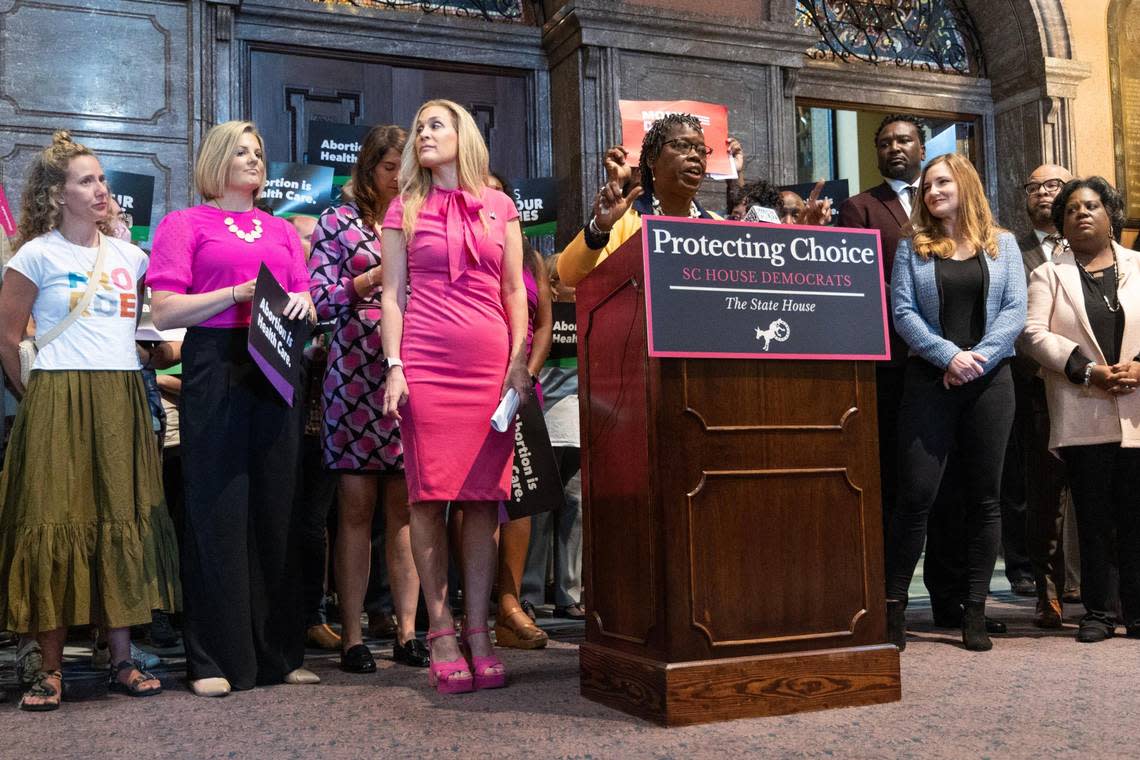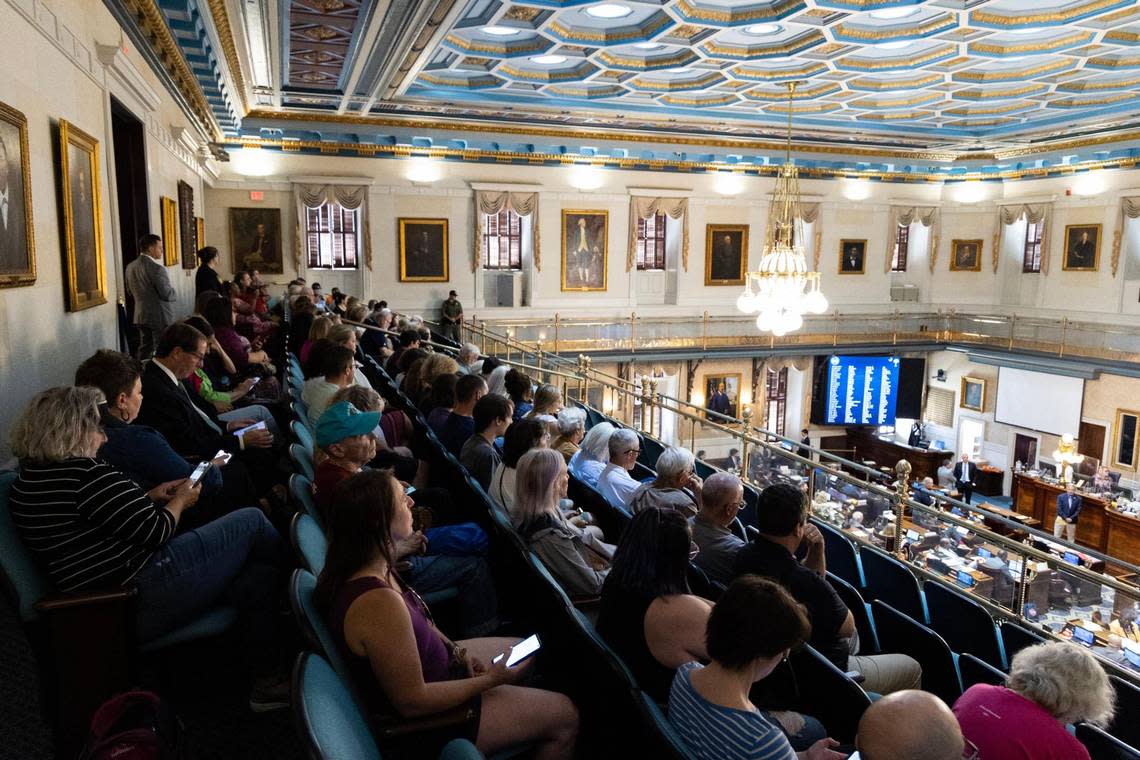SC House Republicans pass 6-week abortion ban over Democrats’ opposition
South Carolina moved closer to a six-week abortion ban on Wednesday after the House voted to ban abortions once fetal cardiac activity is detected, an effort to put the measure back before the state Supreme Court, which already ruled a previous ban unconstitutional.
The 82-33 vote, mostly along party lines, occurred after 24 hours of debate over two days and hundreds of unsuccessful tries by Democrats to amend the bill by tacking on changes to, for example, move the limit to 12 weeks; put the issue on the ballot; and to require the state cover funeral costs should the mother or fetus die as a result of being denied an abortion.
“None of you in here, as far as I know, are an obstetrician-gynecologist,” state Rep. Gilda Cobb-Hunter, D-Orangeburg, told colleagues Tuesday, the first day of the debate. “Y’all don’t get it twisted. When these universities give you these little honorary degrees and you think that makes you a real doctor, you’re not a real freaking doctor. You have no real medical training.”
Only three lawmakers voted with the other political party: State Rep. Jerry Carter, R-Pickens, voted against the bill; and Democratic Reps. Lucas Atkinson, of Marion, and Jackie Hayes, of Dillon, joined Republicans to send the bill back to the Senate.
House Democrats hold 36 seats in the 124-member chamber.
Carter, whose district includes the city of Clemson and Clemson University, said a large majority of his constituents reached out in the last several weeks to reinforce that they opposed the bill.
“When I was elected in 2020, I told everybody that my mission was to represent their interests. By taking that vote last night, I represented the interests of my constituents, not to pass a six-week abortion bill,” said Carter, who said he’s concerned with the limit and the legislation’s constitutionality.
The House vote was yet another effort by Republicans to further restrict abortions in the state, down from the current 20-week ban, after the U.S. Supreme Court’s June 2022 Dobbs’ decision, which overturned the 1973 landmark case Roe v. Wade, and after the S.C. Supreme Court in January ruled the state’s previous six-week ban unconstitutional.
The so-called “fetal heartbeat” bill now heads back to the Senate, where lawmakers could agree to the House changes, sending the bill to the governor’s desk. Senators, who passed a six-week ban in February, also could reject the House changes, putting the legislation back on the negotiating table.
This time, all five female senators — made up of three Republicans, one Democrat and one Independent — will challenge the House-modified Senate bill, Sen. Sandy Senn, R-Charleston, told CNN Thursday. What’s not certain, she added, is whether the three male Republican senators — Tom Davis, of Beaufort, and Horry County’s Greg Hembree and Luke Rankin — will join them as they did in April, when the Senate rejected a near-total abortion ban.
“My position has been if (the House) essentially, in effect, passed the equivalent of what the Senate passed, I would support it,” Davis told The State Friday. “But if they deviated from it, or if they materially changed it, then I would not support it.”
Hembree and Rankin could not be reached by press deadline.
Either way, should the governor sign the bill — Gov. Henry McMaster has indicated he would — it is highly likely to be challenged.
The six-week ban would prohibit abortions once fetal cardiac activity is detected, typically around the sixth week of pregnancy, when most people don’t know that they’re pregnant. The bill, S. 474, includes exceptions for rape and incest no more than 12 weeks, fatal fetal anomaly and the mother’s life.
South Carolina has three abortion clinics.
Vicki Ringer, director of public affairs for Planned Parenthood South Atlantic, said while her organization will “do everything we can to fight against (S. 474)“, they don’t commit to legislation.
“Anti-abortion legislators in the House want to force people, including children, to give birth in this state and make abortion impossible to access,” Ringer said. “Every day that this dangerous abortion ban doesn’t become law is a good day for the people of South Carolina. But we shouldn’t be here in the first place. Lawmakers are wasting more taxpayer dollars to shove an abortion ban down our throats during yet another special session. We urge the Senate to once again reject this overreach into our health care decisions.”

Ongoing debate about abortion restrictions
For months, House and Senate Republicans have been at a standstill over how restrictive an abortion ban should be. That struggle was highlighted in a fall special session when the House voted to pass a near-total ban while the Senate pushed for six weeks.
Lawmakers appeared to be in a similar standstill this session, which started in January, after the Senate last month rejected the House’s near-total abortion ban, with limited exceptions for rape, incest, fatal fetal anomaly and the mother’s life.
But Republicans said the higher-than-average abortion data, due mainly from people coming from out-of-state to seek the procedure, and North Carolina’s now-12-week ban adopted Tuesday, added a layer of urgency.
“This bill’s not perfect,” state Rep. John McCravy, R-Greenwood, who for months pushed for a near-total ban, said Wednesday. “We know from experience that while this bill will save thousands of lives, it will likely allow 3,000 abortions before a heartbeat is detected in our state every year. Maybe we’ll have a situation where the Senate will allow us to save 99% of unborn citizens.”
The legislation includes a handful of House-backed amendments, ranging from a child support requirement at conception to a requirement that a minor must have parental consent or court approval before the minor can get an abortion.
“Tell them there’s another option. Yes, pro-life means after birth, throughout their whole life. Let’s teach our young people how to be responsible,” state Rep. Melissa Oremus, R-Aiken, who had a child at 16, said Wednesday. “It is a win today.”
Lawmakers returned to the State House Tuesday to debate the bill after McMaster called the Legislature back for a rare special session, given lawmakers did not pass a sine die agreement, or an outline dictating what they could return to debate post-session.
“So, $60,000 a day because of the Republicans calling us back into session,” said state Rep. John King, D-York, referring to the Tuesday cost for lawmakers to convene. “So, I want to stand up because I’m not gonna get blamed for something that (Republicans) caused. We’ve wasted a whole legislative session executing people, providing guns to everybody, and today you want to save lives.”
The Senate is expected to return to Columbia next week to take up the amended six-week ban.
State Sen. Penry Gustafson, one of three Republican female senators, told The State Friday she will not support the legislation after reviewing the House changes. In February, Gustafson supported the Senate’s original six-week ban.
“I am supremely disappointed in the direction this bill (has) taken, and I’m frustrated that people don’t understand and know all what’s going on in the Legislature,” Gustafson, R-Kershaw, said. “I will not be supporting the bill as amended. It’s not just a simple one amendment right and read through this. We’re talking about considerable changes.”
Gustafson, whose district was recently redrawn in the last redistricting cycle, said although she’s worried that her opposition to S. 474 will hurt her reelection chances, she said authentically serving her constituents matters more.
“I am doing a good job,” Gustafson said. “If any legislator is doing a good job with their constituents and with legislation, they should not be worried about reelection.”

Democrats seek to expand abortion access
Before the debate, Democrats filed more than 900 amendments in an attempt to expand abortion access, and repeatedly deployed numerous procedural tactics to stop and slow down debate, to no avail. Defending the strategy, state Rep. Heather Bauer, D-Richland, said Wednesday, “every minute we’re here, we’re helping women gain access to health care.”
Some of the amendments were “frivolous” and “absurd,” House Speaker Murrell Smith, R-Sumter, said.
For example, Smith said there were amendments for a “new state motto, ‘Y’all means all.’”
“We have ‘welcome to South Carolina’ signs, that (say), ‘South Carolina does not support women’s rights’ as you enter our state,” Smith said. “We have driver’s licenses messages that say, ‘South Carolina does not support women’s rights. Abortion is illegal here.’ We want signs on buildings, saying that, ‘We don’t support women’s rights.’
“We required each person in this state to read ‘The Handmaid’s Tale,’” Smith continued. “We’re having male masturbation being declared illegal, and we’re having menstrual cycles reported to DHEC (Department of Health and Environmental Control).”
Critics say the legislation mirrors what the South Carolina Supreme Court ruled unconstitutional in January. Now, the court is made up of all men after Justice Kaye Hearn, the only woman on the high court, retired due to the state’s 72-year age limit and was replaced by now-Justice Gary Hill.
Republicans say the latest measure responds to the high court’s decision, with hopes it passes muster during the inevitable court battle that will ensue.
“We’ll see you at the polls,” Bauer said. “We’ll see you in court.”
Editor Maayan Schechter contributed to this report.

